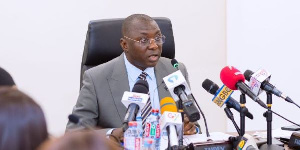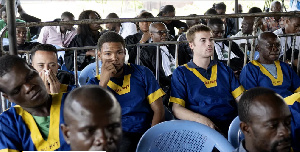- Home - News
- Polls
- Year In Review
- News Archive
- Crime & Punishment
- Politics
- Regional
- Editorial
- Health
- Ghanaians Abroad
- Tabloid
- Africa
- Religion
- Election 2020
- Coronavirus
- Photo Archives
- News Headlines
- Press Release
General News of Monday, 9 May 2022
Source: rainbowradioonline.com
Coups, threats of terrorism have tagged West Africa as dangerous - CDS
The Chief of the Defence Staff (CDS), Vice Admiral Seth Amoama, has opined that coup d’etats and the constant terror threat in the sub-region are making it difficult for African leaders to harness the vast resources under a peaceful environment to enhance the well-being of the citizenry.
He posited that these issues undermine the reputation of the region placing it in a category as the most dangerous region in recent times.
He called for a collective effort in addressing the matter.
“It is my fervent prayer that we will continue to support our shared decisions and actions, particularly, in ensuring a formidable joint force that is well trained, well-motivated with the requisite capacity and logistics to deal with the security challenges within the region.”
To him, the region needs an effective implementation of the proposed strategies and solutions aided by adequate funding and robust logistics support in addressing the issues in the Gambia, Guinea Bissau, and the issues of the frontline countries such as Niger, Mali, Burkina Faso, and Chad.
“We hope that the ECOWAS Commission will continue its efforts in exploring other sources of funding to support our governments.”
The CDS commended ECOWAS Commissioner for Political Affairs, Peace and Security, Gen. Francis Behanzin, for the role he had played in reducing the incidence of terrorism and insurgency.
On his part, Gen. Behanzin explained the meetings between the various military chiefs would help them coordinate their actions in fighting terrorism and insurgency.
According to him, the five-year plan of action adopted by the ECOWAS heads of state had eight components, beginning with training, equipping the defence forces in the region, sharing information and intelligence, border control, and community sensitisation.
“Sharing information and intelligence between agencies as well as civilians sharing information with the military will help elaborate on the plan of action and allow for the appropriate response of intelligence agencies to be put in place by member states,” he said.











